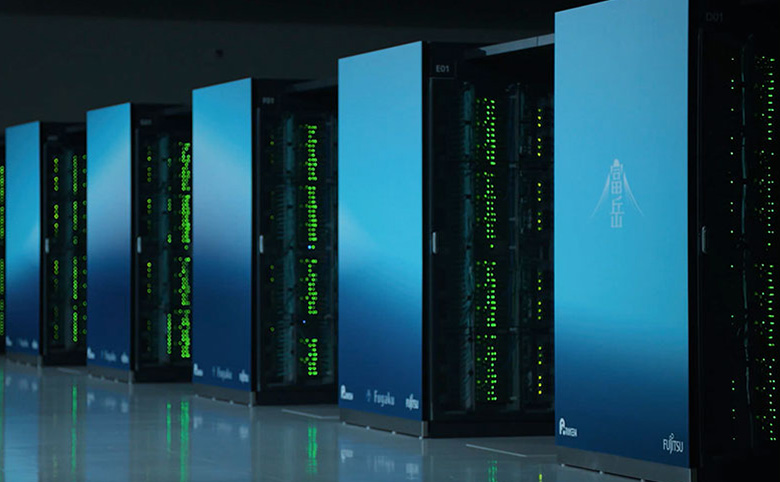Contributing to a sustainable world Fujitsu CTO on Open Source
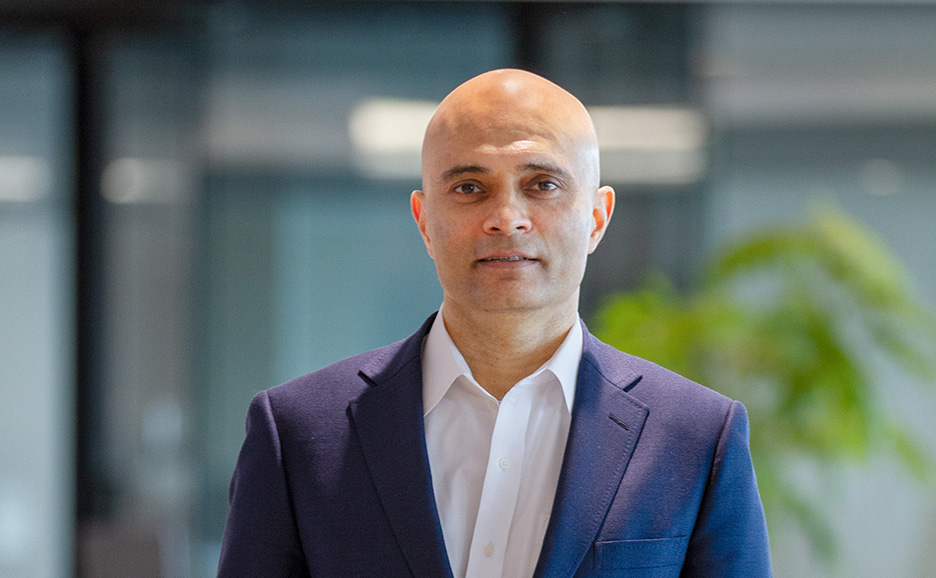
Article | 2023-12-5
7 minute read
Fujitsu is committed to fostering a sustainable world through innovation and trust-building. The company believes that open-source technologies are instrumental to this vision.
We recently had the opportunity to speak with Vivek Mahajan, the Executive Officer and Senior Executive Vice President Chief Technology Officer at Fujitsu, about an exciting new open-source project.
Open Source: Bridging the Gap in a Polarized World
--- Why is Fujitsu now prioritizing open source?
In recent years, the open source community has become a hotbed for emerging technologies. By uniting diverse, skilled developers and companies with vast development resources worldwide, we anticipate the evolution of technologies that can address shared global challenges.
To contribute to a more sustainable world, our company is promoting R&D initiatives aimed at resolving societal issues. By joining forces with global entities through our involvement with the open source community, Fujitsu's advanced technology can expedite the resolution of more societal problems.
One of the pressing social issues that has surfaced in recent years is the increasing polarization of the world. According to a survey conducted by Fujitsu involving 1800 business leaders across nine countries, 42% expressed concern that while global cooperation is crucial for sustainability, the world is becoming more divided due to differing social values. This divide is also evident in the realm of technology, where there is a growing disparity between those who have access and those who do not, due to these varying social values.
However, the silver lining is that 77% of business leaders are placing a greater emphasis on digitalization for sustainability. This is where open source technologies can play a pivotal role. An open source ecosystem is vital for the swift propagation of new digital technologies, enabling their implementation anywhere and everywhere.
--- How long has Fujitsu been working on open source?
Fujitsu has a rich history of contributing to the open source community. Our journey began in 1999 when we started supporting Linux. In the early 2000s, we collaborated with server vendors and the Open Source Development Labs (OSDL), which later became The Linux Foundation, to foster the growth of the open-source project ecosystem. Fujitsu made a significant breakthrough in 2005 by becoming the first company globally to support the Linux kernel on mission-critical servers, paving the way for "mission-critical Linux." In 2007, we co-founded The Linux Foundation, building on the foundations of OSDL and in partnership with industry peers.
Looking ahead, our collaboration with The Linux Foundation and the IOWN (Innovative Optical and Wireless Network) Global Forum is set to drive the development of Linux and Kubernetes. This partnership will also spearhead new technological innovation, enabling Fujitsu to realize its next-generation infrastructure- Disaggregated Computing (specifically, our PRIMERGY CDI)- through open source development contributions.
Even for the development of the Fugaku supercomputer, we prioritized collaboration with the open source community. We utilized a Linux distribution that leverages a wealth of open source software and ISV products, and the A64FX CPU based on the Arm architecture.
Fujitsu remains committed to fostering an ecosystem in partnership with the open source community. Most recently, we announced our leadership in new open source projects in the areas of Unified Acceleration, Web3, and AI.
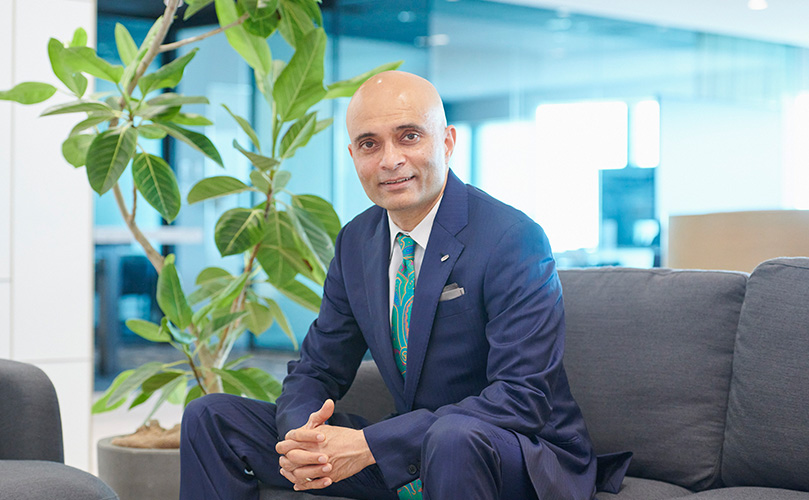
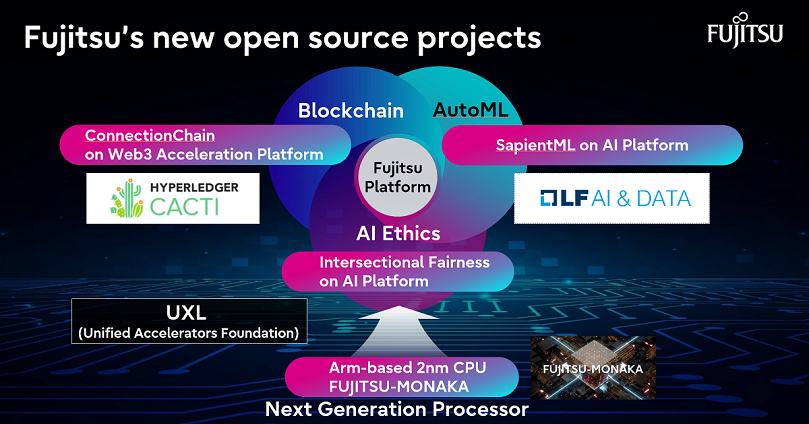
Expanding Customer Options with the FUJITSU-MONAKA Ecosystem
--- What initiatives is Fujitsu undertaking D60in the area of Unified Acceleration?
Fujitsu became an inaugural member of The Linux Foundation's Unified Acceleration Foundation (UXL) on October 5, 2023. The UXL's goal is to allow a single source code to generate native binaries optimized for a variety of accelerators, including CPUs, GPUs, and FPGAs. Through our active participation in the UXL's open source community, we are enabling customers to operate various accelerators, including FUJITSU-MONAKA, using standard protocols. This initiative is aimed at expanding hardware options for our customers.
FUJITSU-MONAKA is a 2-nanometer, Arm-based CPU that we are developing specifically for data centers. It leverages proprietary technologies such as microarchitecture and low-voltage technology, which were honed in the development of the Kyo and Fugaku supercomputers. Additionally, it incorporates industry-leading technologies like 2-nanometer processes and the latest Arm architecture to achieve both power efficiency and high performance. This results in carbon-neutral green data centers that offer twice the energy efficiency of our competitors, while also delivering double the performance for faster AI workload processing.
In line with the open-source development trend set by Fugaku's A64FX CPU, FUJITSU-MONAKA provides access to a wide array of open-source software and ISV products from the Arm ecosystem. It supports major Linux OS distributions and standardizes system architectures such as GCC, glibc, live-patch, and papi. Furthermore, it simplifies usage with standard tools like Python, Java, and LLVM.
- Fujitsu's activities in IOWN Global Forum
- *This article is based on results obtained from a project subsidized by the New Energy and Industrial Technology Development Organization(NEDO).
Connect heterogeneous blockchain with OSS community
-- What is Fujitsu's role in the open source community within the Web3 space?
Web3, the forthcoming generation of the Internet, is envisioned as a decentralized network that fosters trusted connections in the digital realm. In March 2023, we launched our Web3 Acceleration Platform to our partners. This platform leverages our expertise in trust, blockchain, and computing technologies and applications, fostering community building and collaborative development in the Web3 space.
Blockchain, a key technology for Web3, comes in various forms, and interoperability - the ability for different blockchains to communicate - is a challenge. To address this, we developed ConnectionChain, a proprietary technology that facilitates cooperation between different blockchains. In June of the same year, we tested and integrated ConnectionChain into the Data e-TRUST data trust infrastructure of our Web3 Acceleration Platform.
At the core of ConnectionChain is the "extended smart contract" technology, which allows multiple blockchains to operate as a unified, consistent system. To streamline development, our collaboration section, which reconciles the differences between each blockchain's specifications, incorporates a plug-in (Cacti-LP) developed by Hyperledger Cacti. This open source project, under the Hyperledger Foundation, focuses on ensuring interoperability. This integration allows Data e-TRUST to work with a variety of blockchains that support Hyperledger Cacti. Additionally, we developed a plug-in to connect other blockchains to Data e-TRUST and donated the source code to the Hyperledger Cacti community.
Looking ahead, we envision ConnectionChain evolving into a technology that ensures interoperability not only between Web3 blockchains but also between Web3 and pre-Web 2.0 assets. We plan to achieve this by collaborating with the open source community and our partner ecosystems.D6
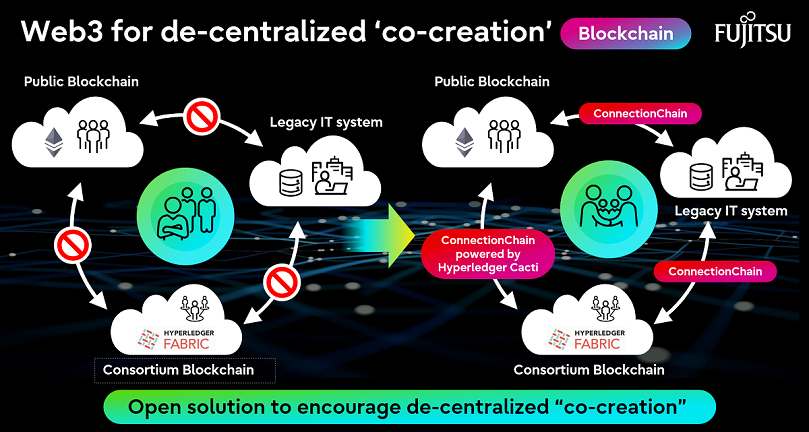
Open source AutoML and AI fairness technologies developed in-house
--- What are Fujitsu's open source initiatives in the AI space?
Fujitsu has been at the forefront of AI development for approximately 30 years, holding the most AI-related patents in Japan from 2014 to 2022, with a total of 970 inventions. In April 2023, we launched the Fujitsu AI Platform (code-named Fujitsu Kozuchi). This platform allows our customers and partners to safely test the latest AI technologies.
Fujitsu Kozuchi offers AI core engines such as generative AI, automated machine learning technology (AutoML), and Actlyzer behavior analysis technology that recognizes human behavior. It also provides AI innovation components for various applications and industries, including new drug development, materials discovery, manufacturing, and retail. To achieve explainable AI, it incorporates features that can assess the reliability of its results, and employs AI fairness technology to detect biases in learning data, addressing AI ethics.
In August 2023, we open-sourced our proprietary AutoML and AI fairness technologies from Fujitsu Kozuchi's AI core engine. These technologies were officially recognized as open source projects by The Linux Foundation in September of the same year, under the names "SapientML" and "Intersectional Fairness," respectively. We are committed to collaborating with developers worldwide to further these technologies. Any technical updates from each project will be incorporated into Fujitsu Kozuchi.
--- Will Fujitsu continue to contribute to open source?
Collaboration across companies, industries, and nations is crucial for a sustainable world. Fujitsu's contributions and partnerships within the open source community foster global cooperation and deliver sustainable value to our customers and partners. Forming alliances and standardizing practices with global entities through the open source community also aligns well with our business strategy.
Moving forward, Fujitsu will concentrate its R&D resources on five key technology areas: computing, networking, AI, data and security, along with converging technologies. These are the areas where we have the expertise to drive business transformation and create a sustainable society through digital innovation. We will continue to engage with the open source community in these areas to enhance the value of our technology and expedite the resolution of societal issues.
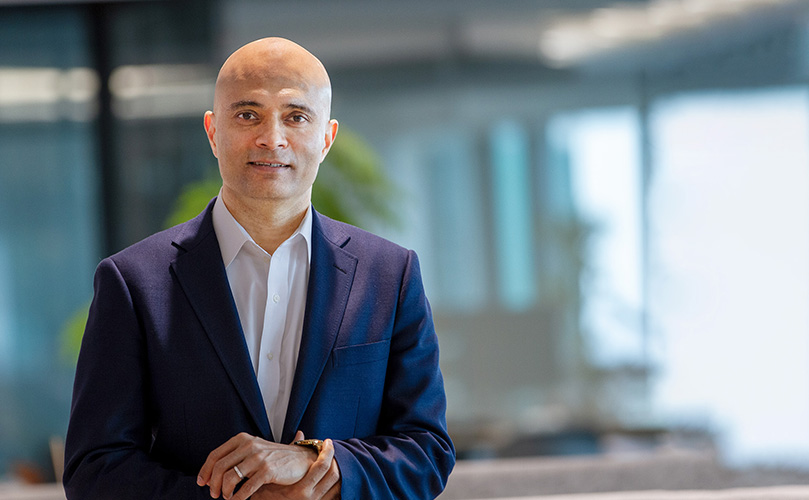
Vivek Mahajan
Fujitsu Corporate Executive Officer, SEVP, CTO, CPO, Co-Head of System Platform
Mahajan embarked on his career as a technology specialist in Silicon Valley after earning a master's degree in electrical engineering and an MBA in financial accounting. He held leadership roles at several leading global companies, including Tandem Computers, General Electric, Siebel Systems, Oracle, and IBM. In July 2021, he took on the role of Global Chief Technology Officer (CTO) at Fujitsu.
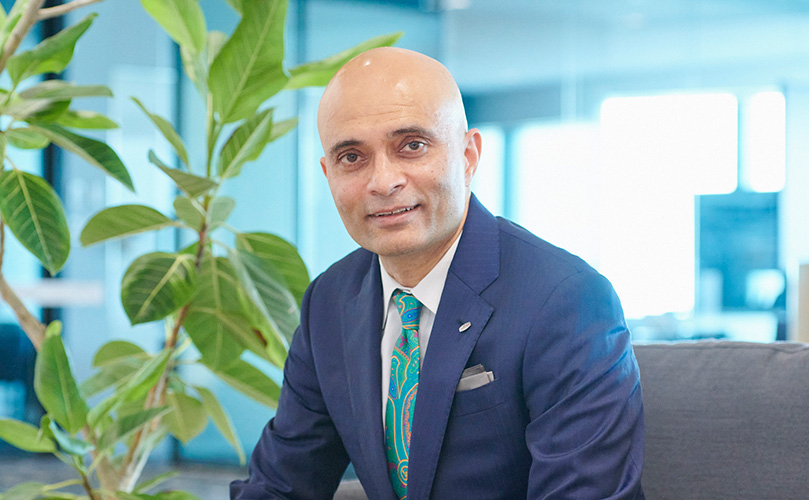
Related article
Vivek Mahajan (CTO) Talks about Creating a Trusted Digital Society

